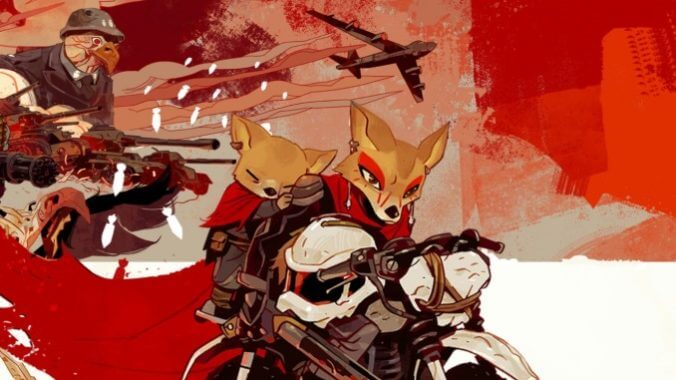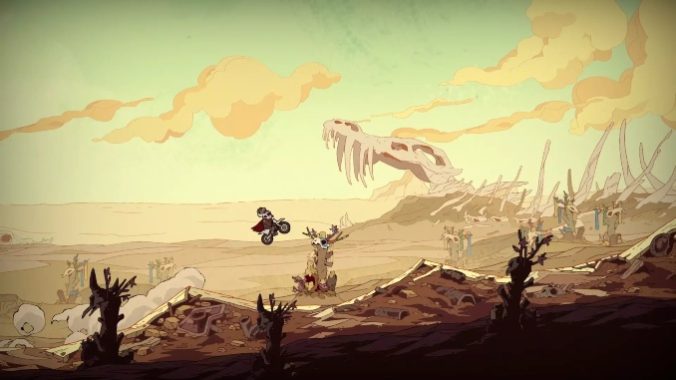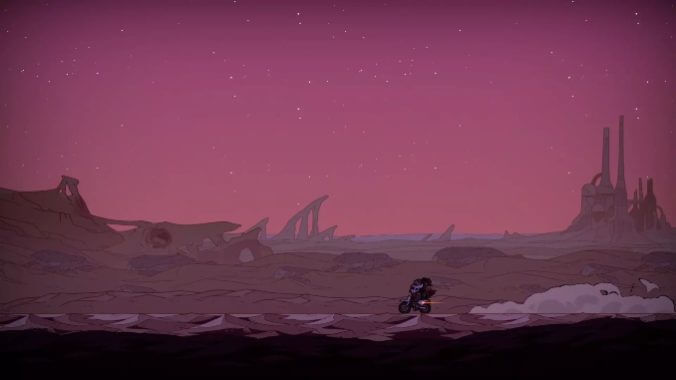Laika: Aged Through Blood Is a Gunslinging Ballad with Impressive Range
Games Reviews Laika: Aged Through Blood
Over the last decade, there’s been no shortage of videogames about sad dads. From Joel and Ellie’s trek through a cordyceps-infested America to an angry Greek god’s quest, many “prestige narratives” that have dominated recent games discourse have focused on bonds between fathers and sons. While this trend has given us plenty of ruminations on how masculine violence can be passed from parent to child or the ways toxic gender expectations can make it difficult for these dads to open up, we’ve been deprived of similar stories following gruff, melancholic moms.
Laika: Aged Through Blood, the latest from the Madrid-based developer Brainwash Gang, fills this gap. Laika is a canine gunslinger tasked with protecting her daughter and village from the encroaching imperialistic might of the Birds, a quickly expanding military force that seeks to dominate all non-beaked life. Amidst a Western-tinged wasteland that is bracing for the end, our hero is forced to rely on her six shooters to shield those she cares about from impending doom. Although it has some rough edges—like a game-breaking bug that left me howling—between its slow-mo motocross shootouts, grim but not overbearingly nihilistic backdrop, and thoughtful exploration of imposed sacrificial motherhood, it blends its inspirations to create something tonally unique.
As for its ludic influences, Brainwash Gang has labeled their game as a “motorvania,” and it’s easy to see why. You know the drill at this point when it comes to Metroid-style experiences such as this one: the map is technically open from the start, but areas are gated off by requiring specific traversal abilities, necessitating some degree of backtracking and exploration. However, novelty enters the picture regarding the other half of the developer-described portmanteau. As you move through this semi-open world on a BMX bike carved out of bone, you’ll launch off ramp-like dunes and carefully adjust the orientation of your vehicle to avoid tipping. Finagling around obstacles is nowhere near as tricky as in games like Trials, but things get quite complicated once trigger-happy foes enter the picture.

A single bullet means death, and even as checkpoints are plentiful, enemies quickly fill the screen with hot lead. Luckily, the underside of your bike is bulletproof, and you can block incoming fire by adjusting its angle in midair. Additionally, you have an increasing array of armaments, access to a bullet time state, and a parry that will return projectiles to their sender. Reloading your guns requires a backflip, and the parry recharges from a front flip, making stylish air movement a necessity.
Put together, these core mechanics create a delightful flow, evoking the tricky sensation of trying to pat your head and rub your stomach at the same time as you use the left stick to block fire with your undercarriage and the right to take aim and scatter bird brains across the desert sand. The slow-mo state is a necessary tool that gives just enough time to dance around projectiles, making for exchanges whose grace is only undercut by the bucket loads of viscera. Your bike feels responsive to maneuver, and details like the satisfying audiovisual kick that comes from quickly throttling the gas or the way the environment encourages BMX acrobatics as you somersault, switch directions, and use your shotgun to alter your aerial trajectory all make it feel like you’re truly the scourge of these avian invaders.
And while its mechanics do a commendable job fulfilling classic videogame power fantasy, its narrative ensures that its grindhouse mayhem is more than just self-indulgent spectacle. Even as it begins with an inciting incident defined by grotesqueness as someone is “crucified by their own guts,” there are shades of empathy underneath all the bloodletting. Most notably, this is a story about motherhood where Laika tries to carve out a place for her daughter in this borderline hopeless post-apocalyptic world. Their relationship is an essential anchor that offers heartfelt exchanges, such as small conversations before bed or when our protagonist calls home to check what Puppy had for lunch in the middle of a violent mission in the wastes. Similarly, Laika’s relationship with many in her community offers an occasional palate cleanser from her bitter work, as she’s constantly trekking back to her village to listen to concerns, requests, and music. It all creates the sense that there’s something worth fighting for despite the increasingly slim prospects for this setting.
However, with these connections also come things that can be lost, and as Laika is sent from one goal to the next, she frets over the possibility that her burdens will be passed down to her kin. While we see the little joys Laika receives from raising Puppy, being a mom isn’t presented as entirely idyllic, and we see how she’s expected to take on a sacrificial quality to protect those around her, forgoing her personal wants in the process. Although our hero and her daughter have a healthy bond, the same can’t be said for her relationship with her own mother, who trained her to become an instrument of death and carry the immortal curse passed down their family line. These circumstances add wrinkles to the storytelling, conveying that while our protagonist has something worth fighting for, it’s unfair that, like many women, she’s expected to give everything to those around her. Similarly, even as Laika is empowered in the narrative and gameplay (she is a gun-toting badass referred to by her enemies as the “Grim Biker”), she also resents her powers and how she’s forced to use them. In many ways, she is a microcosm of this work’s pathos: outwardly laconic and terse but containing greater complexities under the surface.
A similar degree of thoughtfulness extends to the other elements of its worldbuilding, such as the heavily militarized Birds. Unlike similar tales about anthropomorphized animals, the Birds aren’t depicted as inherently “evil” because of their species but due to more complex factors like rotten ideology. We get tidbits detailing the rise of imperialism in their society, meet pacifists who silently resist, and come across revolutionary Bird factions that seek to undermine the war machine. There is a lot of specificity at play, and between its particular brand of militarism and Roman Catholic ties, this society seems to draw on the living memory of Falangist Spain, among other regimes. To be clear, the story unambiguously condemns the actions of this fascist government, as exemplified by how gratifying it is to chew through the agents of this empire, but there are smart considerations here that add well-considered shades to this setting. Additionally, there’s a clever gameplay choice that I won’t spoil, which tied into these nuances and created one of my favorite realizations in a game this year.

A soulful soundtrack further amplifies this pensive atmosphere. These songs are framed as though they’ve been written by an in-universe band who capture the headspace of those inhabiting this doomed world, as haunting vocal performances and sun-soaked acoustic guitars express imminent ecological collapse and the Birds’ encroaching imperialism. On top of quoting the scores that have accompanied many past Westerns, this music offers a glimpse into the emotional reality of living here as tracks diegetically play on Laika’s cassette tapes. Sharp character designs and vibrant background art also help bridge the gap between the brutality and comforting qualities of this experience.
Unfortunately, I encountered one huge hitch that proved an even greater threat than the Birds: an excruciating, game-breaking bug that made it impossible to progress the main story and forced me to ditch a 13-hour plus save file as I started over from scratch. Considering I was playing a pre-release copy, it’s hard to know how widespread this problem will be for those playing after launch, but in combination with many smaller issues I encountered, such as the quest log not updating, my bike clipping into geometry, and being temporarily unable to set my weapon loadout, among others, its possible others may encounter notable issues.
While these problems can be patched, a more fundamental issue with my experience is that despite enjoying the motorcycle gunplay acrobatics, I got less out of its Metroid-like design. Games in this sub-genre generally provide plentiful upgrades that fundamentally transform trips across old areas, but here, new abilities are hard to come by, which means that backtracking to find undiscovered crevices isn’t much of a priority. On the contrary, moving through previously trodden territory becomes increasingly tough as things progress, as a growing number of soldiers patrol the wastes. Even though this decision comes across as thematically appropriate and was likely made to ensure that returning to these locales would remain novel, it was often painful to stumble around in search of a vaguely described objective for side missions as I accidentally headed in the wrong direction and needlessly battled heavily armed platoons. Another issue is although I was generally impressed by this story and its sense of place, this tale wraps up too abruptly, with an ending that would have benefited from additional lead time and more closure.
Still, despite these problems, I’m glad I took the journey across Laika: Aged Through Blood’s barren hellscape. Despite its extreme violence and unapologetic bleakness, this space is defined by a surprising emotional range thanks to its compelling protagonist and her brutal quest to save those she loves. Motorcycle treks through the wastes are backed by a soundtrack that teases out pain only partially staunched by the thrills of motorcycle-backed duels. And perhaps most notably, it works as an underrepresented game about motherhood, detailing both the unfair expectations and triumphs that come from being a mom. It’s an experience capable of conjuring powerful feelings: disgust, despair, and a smoldering hope that our gunslinger’s actions can improve the lot of those closest to her.
Laika: Aged Through Blood was developed by Brainwash Gang and published by Headup. Our review is based on the PC version. It will available on PlayStation, Xbox, and Switch at a later date.
Elijah Gonzalez is an assistant TV Editor for Paste Magazine. In addition to watching the latest on the small screen, he also loves videogames, film, and creating large lists of media he’ll probably never actually get to. You can follow him on Twitter @eli_gonzalez11.